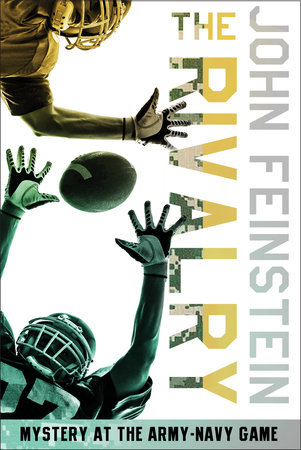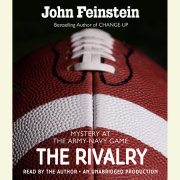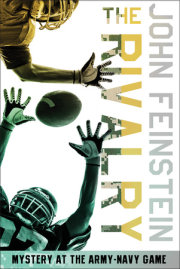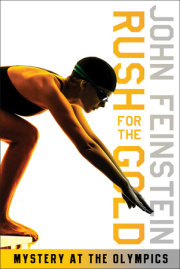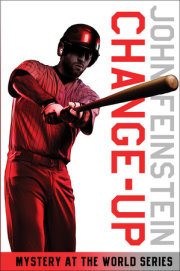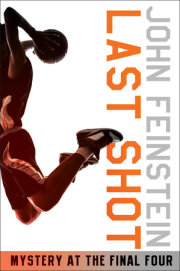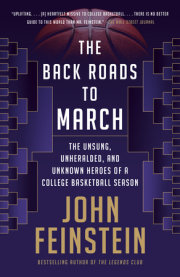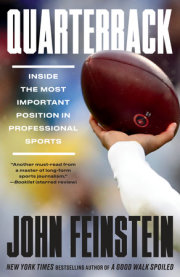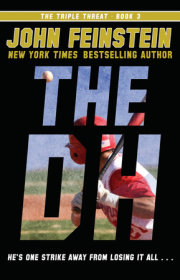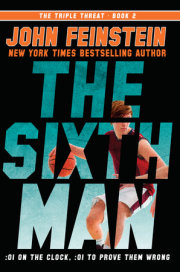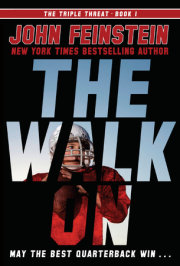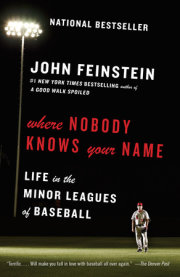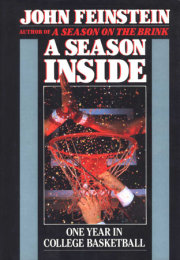GAME DAY: 3 HOURS TO KICKOFF
"Here they come."
At the sound of Susan Carol Anderson's voice, Stevie Thomas instantly did two things: he turned to look at the tunnel at the far end of FedEx Field, where the Naval Academy band would be emerging at any moment, and he also stood up very straight because that was always what he did when standing next to Susan Carol.
From underneath the stadium he could now hear "Anchors Aweigh," the Navy fight song. He had memorized the words to both "Anchors Aweigh" and "On, Brave Old Army Team" in the past two weeks.
Sure enough, the band was marching out of the tunnel. It was three hours before kickoff of the Army-Navy game, but the stands on both sides of the stadium were more than half full.
The game was scheduled to start at precisely 12:08 p.m., and Stevie and Susan Carol had arrived at the stadium with Bobby Kelleher and Tamara Mearns shortly after 7:00 a.m. Kelleher and Mearns were married and both columnists, but they worked for rival papers--Kelleher for the Washington Herald, Mearns for the Washington Post. They had become unofficial mentors to the two aspiring teenage journalists, but Stevie and Susan Carol had covered so many major sporting events in the past couple years that they felt like old pros. And so the four of them chatted comfortably on the sidelines as the traditional march-ons began.
First the entire student body of Annapolis would march onto the field, followed by the entire student body of West Point. Stevie now knew a good deal about both Army and Navy, having spent much of the last few weeks at the two academies.
"Ladies and gentlemen," the PA announcer said, "please welcome, from the United States Naval Academy, the Brigade of Midshipmen!"
The band peeled to the left to start working its way up the far sideline, and Stevie could see the first of Navy's thirty-two companies marching into the stadium. To Stevie it looked as if the mids were marching in lockstep, about ten across as they followed their company commander onto the field.
But Kelleher was shaking his head. "They can't march," he said, a smile on his face. "Look at them, they're practically loping."
"Who needs to march on a boat?" Mearns asked.
"Yeah, yeah," Kelleher said. "But they almost never practice except the week of this game. The Army kids march all the time."
"Spoken like an Army fan, Bobby," Susan Carol said, her lilting North Carolina accent in full force. "You showin' bias already?"
Everyone laughed as the third company arrived on the field. "Look, I've told you, Susan Carol, I grew up in New York, but I've been around Navy ever since I came to Washington. I have no biases."
"Don't you always say that everyone has biases and we just have to be aware of them?" Stevie said.
Kelleher looked at him and shook his head. "That's the problem with fourteen-year-olds," he said. "They're always listening when you talk."
"Don't believe it, Bobby," Susan Carol said.
As each new group began its march into the stadium, the announcer would say the company's name and the names of their company leaders, and cheers would rise up from the crowd.
Two men strode purposefully toward them down the sidelines. Pete Dowling was tall, with close-cropped graying hair, and Bob Campbell had jet-black hair, but otherwise they were hard to tell apart in their Secret Service uniforms: dark suit, sunglasses, and wires running from their shirt collars up to their right ears.
"How's it looking?" Kelleher asked Dowling as the two men approached.
"Worst problem we've had is some fans trying to smuggle in alcohol," Dowling said. "Cold as it is, I don't really blame them."
It was a chilly morning--only about thirty-five degrees. But the sky was clear, and with the sun shining, it would warm up by game time. Football in December--it was bound to be cold.
Campbell turned to Stevie and Susan Carol. "Quite a sight, isn't it?"
"Yes! And it's a fabulous view from here." Susan Carol had accompanied Campbell on a security sweep earlier, and the two hours had been mind-numbingly dull--which was okay with her. She'd had enough excitement in the past week. They had gone from one luxury box to another while Campbell made certain that every nook and cranny had been checked and rechecked by agents and police and bomb-sniffing dogs.
Their tour had concluded in the incredibly plush owner's box, which was where the president would sit during the first half of the game. Then he would cross the field at halftime, as was tradition, and sit in a specially constructed box on the Navy side during the second half.
Susan Carol couldn't help but notice that, other than the luxury-box area, the stadium was kind of a dump--even with all the bunting that had been hung for the game. A lot of the seats were at bad angles; there were some with almost no view of the field at all. It was a good reminder of how lucky she was to be here on the sidelines.
"Bobby's been pointing out that the Navy guys can't march," Stevie said.
"Bobby's an Army fan," Agent Dowling said. "But he's right anyway."
"Look, I always say Army wins the march-on and Navy wins the playing of the alma maters when the game's over," Kelleher said. " 'Blue and Gold' is a much better song than 'Alma Mater.' "
Mearns looked carefully at Dowling. "You're serious? There's nothing going on that makes you nervous? We're still not quoting you on anything."
Dowling nodded. "You guys have been as good as your word on that. If something was going on, I'd at least say I couldn't tell you. But it's all quiet so far. Everything has been checked and we'll do another sweep of all the locker rooms, the tunnels, and the field before the president gets here."
"Still on schedule for eleven forty?" Kelleher asked.
"Wheels down on his helicopter outside at eleven thirty-five," Campbell said, glancing at his watch. "He'll meet the teams, flip the coin, and we'll get him up to his box in time for kickoff."
Stevie was still a little bit nervous. The past two weeks had been eventful, to say the least. Plus, his history at major sporting events with Susan Carol made it almost certain that something was going to happen before the day was over.
The Brigade of Midshipmen, all four thousand of them, were now spread out across the entire field in thirty-two perfect units. They were staring straight ahead, facing the Navy fans. It was an impressive sight, and the fans thought so too--they were all on their feet cheering.
Suddenly, all four thousand midshipmen pivoted--as one--to turn and face the Army fans.
"A-R-M-Y--goooooo, ARMY!" they said together, doffing their caps as they finished. Applause and a few cheers came from the Army fans, most of them dressed in black and gold.
The midshipmen stood still for a few seconds, caps still in the air. Then, again as one, they put them smartly back on their heads, paused, and pivoted so they were facing the Navy fans again.
"N-A-V-Y--GOOOOOOOOOOO, NAVY!!!!" Their combined voices were about five times as loud.
Stevie felt a chill as the Navy fans erupted, and for once it wasn't the cold. He had really come to appreciate all the Army and Navy traditions in the past two weeks, and this pageantry was like nothing he had ever experienced before.
The midshipmen started to make their way off the field toward the far corner of the stands where they would be seated--although they wouldn't sit at any point throughout the afternoon, once the game began.
And Stevie was anxious for the game to begin. He'd almost lost sight of the game itself amid all the threats and intrigue that had been swirling around. It'd make a great story once it was all over, he felt sure. But a lot still had to happen in the next few hours.
As Dowling reminded him, saying, "Come on, Steve, we've got the first important assignment of the day."
"What's that?" Stevie asked.
"We have to deliver a gun," Dowling said.
FRIDAY NIGHT AT THE PALESTRA
The Army-Navy misadventure began innocently enough, a chance for Stevie to do the two things he enjoyed most in life: being a sportswriter covering a big event and hanging out with Susan Carol.
Stevie was doing one of those two things on a wintry Friday night about a month earlier. He was sitting on press row at the Palestra, no more than a three-point-shot attempt away from the St. Joseph's bench.
There was a time-out with just twenty-five seconds left in the game, and Villanova led St. Joe's 67-65. The din of nearly ten thousand fans packed into the ancient gym was so loud it was difficult to hear anything.
"If St. Joe's pulls this out, Jay will never hear the end of it," Dick Jerardi, sitting to Stevie's left, was saying, leaning close so Stevie could hear him. "They could go on and win the Big East, and all the Villanova fans are going to say is, 'But you lost to St. Joe's.' "
Stevie laughed. He knew the longtime Philadelphia Daily News reporter was right. As successful as Jay Wright had been during his coaching tenure at Villanova--including a run to the Final Four in 2009--his school's fans found any loss to another Big Five school--St. Joseph's, La Salle, Temple, or Pennsylvania--completely unacceptable.
Stevie noticed the St. Joseph's Hawk mascot standing on the edge of the huddle, flapping his wings as always. St. Joseph's motto was "The Hawk will never die," and the student wearing the costume was required to keep his arms flapping at all times throughout a game. Given the difficulty of that task, Stevie hadn't been surprised to learn that whoever was selected as the mascot received a full scholarship for that year.
Even though he really liked Jay Wright and Villanova, Stevie was rooting for St. Joseph's to pull off an upset. For one thing, a win would mean more to the Hawks, who were unranked starting the new season. And he liked Phil Martelli's everyman approach to coaching. Wright was just so smooth--known as one of the best-dressed coaches in the country. Jerardi had told him that Wright wore cologne during games.
TV finally came back from commercial and St. Joe's inbounded. The ball swung to point guard Tommy Jones and he slowly dribbled the clock down. "Oh God," Jerardi murmured. "They're going for the win right now."
The clock ticked under ten seconds. Jones began to approach the key. Out of the corner of his eye, Stevie saw St. Joe's best shooter, Michael Anthony, cutting from the left baseline to the right, getting a screen to prevent his defender from following. Stevie knew what was coming next.
Sure enough, as Jones spun into the lane, Anthony popped out on the right side of the key. Jones got him the ball as the Villanova defenders scrambled. Stevie could see the clock . . . three . . . two . . .
Anthony caught the ball with the clock at two seconds and took one quick dribble to square himself and clear some space. He was just outside the three-point line when he released the shot, and the buzzer sounded with the ball in the air.
Swish.
The St. Joseph's fans exploded! Anthony disappeared under a pile of teammates. The coaches met right in front of where Stevie was sitting to shake hands.
"Gutsy call," Wright said, an arm around Martelli's shoulders.
"I got lucky," Martelli shouted back.
Stevie double-checked the scoreboard: St. Joseph's 68-Villanova 67.
Martelli was right. He was lucky. He would have been second-guessed for days--maybe years in Philly--if the do-or-die shot hadn't fallen.
But Stevie was luckier still. It was an amazing game, and he got to write about it and tell the tale.
Stevie was also lucky that the Villanova-St. Joseph's game was played on a Friday night. He wasn't allowed to cover games on school nights, his parents being a lot more concerned with how he was doing as a high school freshman than his budding career as a sportswriter.
Stevie had almost fallen into it, winning a writing contest when he was thirteen that allowed him to go to the Final Four. There he and Susan Carol, the other contest winner, had stumbled into a plot to fix the national championship game. Thanks to the fact that they had broken that story, the two of them had been asked to cover other events.
Now Stevie wrote for the Washington Herald whenever he could, and Susan Carol wrote for the Washington Post. And he'd found a girlfriend as well as a job. Even though they had endured some seriously rocky moments, Stevie and Susan Carol were going out--well, as much as you could when one person lived in Philadelphia and the other lived in Goldsboro, North Carolina.
As Stevie made his way through the celebrating St. Joseph's fans to the interview room that was underneath the stands, he noticed he had a text message on his phone from Bobby Kelleher: Call as soon as u can. Great game.
Stevie figured it would be at least ten minutes before any players or coaches came in to talk to the media, so he found a corner where his phone got service and dialed Kelleher's number.
"Man, Phil took a hell of a chance playing for one shot," Kelleher said, answering the call.
"Where are you?" Stevie asked, because it sounded almost as loud on Kelleher's end as on his.
"I'm in a sports bar down the street from the Penn State campus," Kelleher said. "I watched the game with Hoops. It absolutely killed him not being there."
Stevie smiled. Hoops was Dick Weiss, a columnist for the New York Daily News. Weiss was a born-and-bred Philadelphian who had grown up watching games in the Palestra. Even though he worked for a New York paper, he still lived in Philadelphia and would always be a Philly guy at heart.
But Kelleher and Weiss were both covering the Penn State-Ohio State football game the next day, which had a noon kickoff, so they had to settle for watching the basketball game on TV.
"Hey, Hoops wants to say hi," Kelleher said.
A moment later, Weiss was on the phone. Even over the noise, his Philadelphia accent was distinctive. "You have to ask Phil what he was doing on the last play, okai?" he said. "He was vurry, vurry lucky that shot went down."
Copyright © 2010 by John Feinstein. All rights reserved. No part of this excerpt may be reproduced or reprinted without permission in writing from the publisher.

